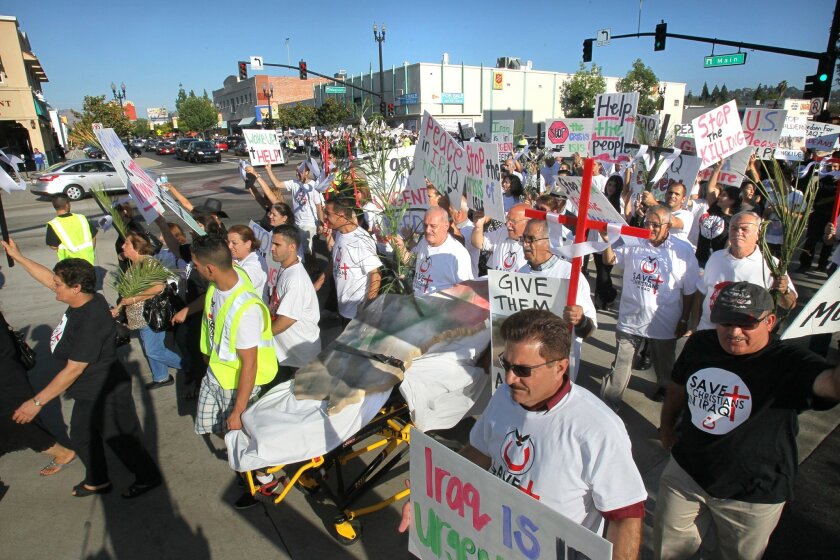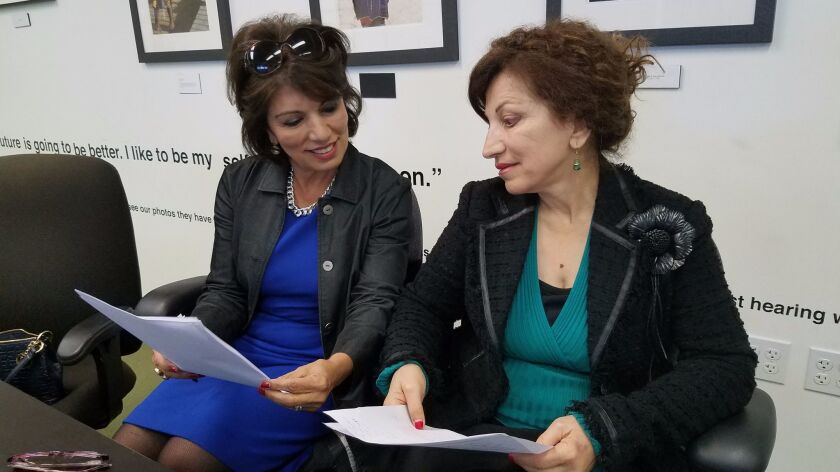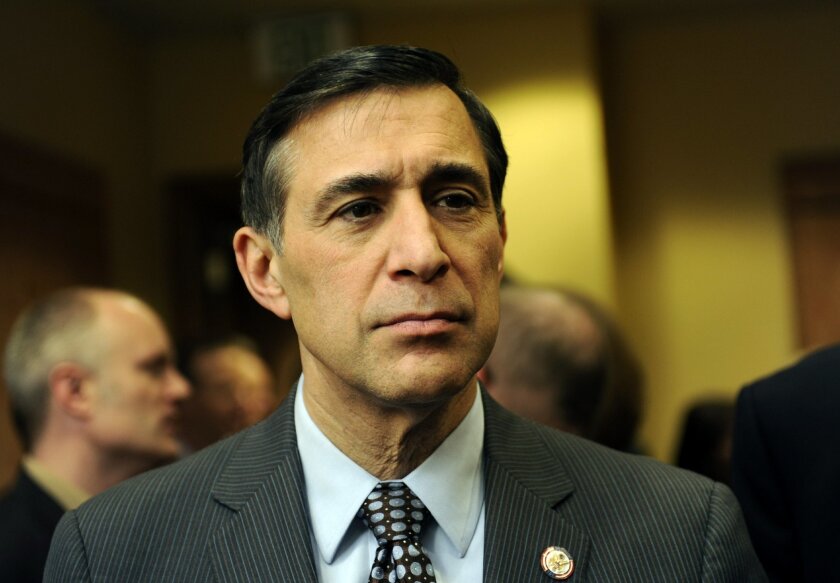Two years ago former Rep. Duncan D. Hunter won re-election in the 50th Congressional District— while under indictment for campaign misspending and while running a campaign that was widely criticized as racist for preying on animosity toward people of Middle Eastern descent.
Now voters in that same district will choose between two candidates of Middle Eastern ancestry to succeed Hunter — either Democrat Ammar Campa-Najjar, who is of Palestinian and Mexican descent, or Republican Darrell Issa, who is of Lebanese descent.
The fact that the 50th District will be represented by someone of Middle Eastern ancestry represents a step forward for the region’s diverse Middle Eastern community, advocates say, and it’s happening when that community is becoming increasingly politically engaged.
“It is incredibly awe-inspiring to see two candidates of Middle Eastern descent vying to represent the 50th,” said Mark Arabo, a prominent advocate for the Chaldean community, a persecuted religious and ethnic minority from Iraq.
“Despite the respective parties that each represents, their paths are uniquely incredible,” he said. “Only a few short generations ago, our relatives were subjected to dictatorship, poverty, and war. It is a testament to the human spirit that these folks have come as far as they have in our beautiful nation.”

In downtown El Cajon marchers walking with a map cutout of Iraq on a gurney lead hundreds of Chaldean protesters as they cross Main Street at Magnolia Avenue in 2016. The march began at St. Michael Chaldean Catholic Church and ended at a rally at Centennial Plaza.
(Charlie Neuman/Union-Tribune)
San Diego County has a burgeoning, multifaceted Middle Eastern community, much of which lives within the 50th Congressional District.
The city of El Cajon, for instance, is home to some 15,000 Chaldeans, one of the country’s largest populations. There also are uncounted numbers of people from Iraq, Syria and Afghanistan in that part of the county.
The U.S. Census Bureau does not provide specific population numbers for people of Middle Eastern or North African descent. However, the Census estimates that the 50th District has an estimated 20,328 residents who identify as being of “Arab” ancestry.
Besma Coda, a cofounder of Chaldean Middle Eastern Social Services, arrived in San Diego County with her family in 1981. At the time there were a handful of families from the Middle East living in El Cajon, she said. Since then the community has grown massively in El Cajon, starting businesses, churches and even schools.
“We really changed the face of the city,” Coda said.
Joseph Sfeir, president of the House of Lebanon in Balboa Park, also pointed to Chaldean businesses in El Cajon and downtown San Diego, and Lebanese, Palestinian and other Middle Eastern business owners throughout San Diego County as examples of how the community has thrived.
“San Diego has a very diverse Middle Eastern community that comes from all corners of the Middle East, and they came here for an opportunity,” Sfeir said.
“We’re all so grateful being here because this country opened up its doors to us and gave us room to be safe, to voice our opinion freely — contrary to where we come from — raise our families in a safe environment, and then give back to our community.... I believe the Middle Eastern community here in San Diego is very much intertwined with the rest of the community at large.”
Despite the community’s growth and visibility, political influence has not necessarily followed.
There have been instances when San Diego’s local Middle Eastern community chose to mobilize politically. In one example, longtime El Cajon Mayor Mark Lewis abruptly resigned in 2013 amid a public outcry over several disparaging remarks he made about the local Chaldean community.
Local advocates say elected officials have not always listened to or engaged the Middle Eastern community.
“Relative to our population, the Middle Eastern community is grossly underrepresented and therefore grossly underserved,” Arabo said.
Wedad Schlotte, vice-president of the San Diego chapter of the American-Arab Anti-Discrimination Committee, shared that view.
“It seemed our politicians have dismissed the Arab community, the Middle Eastern community, and that is partly our fault,” she said. “The politician does not know everything, so it is incumbent on us to reach out and educate them on our needs, our demands, our core values.”

Wedad Schlotte of Mission Hills and Nital Meshkoor of El Cajon, both Iraqi immigrants, discuss Donald Trump’s new executive order at the offices of Partnership for New Americans in City Heights.
(Kate Morrissey/Union-Tribune)
Schlotte, who is Iraqi, added that historically when Iraqis and Arabs immigrate to the U.S. they were fleeing dictatorships and violence in their own countries where they may have seen family members tortured, imprisoned or disappeared.
“The Iraqi community, they come and they are traumatized and have cynicism about the political process,” Schlotte said.
She added that skepticism about U.S. foreign policy also might contribute to a reluctance to reach out to politicians or to pursue elected office.
People of Middle Eastern descent who enter the public eye are often pre-judged, she said.
But Schlotte and other advocates — all of whom spoke of their personal views — say there has been a shift toward more political engagement in the Middle Eastern community. Schlotte said the younger generation that has grown up, gone to universities and gone out in American professional life know the value of voting, even if they may be a bit disaffected.
Coda said progress still needs to be made at getting Chaldeans and Middle Easterners more involved with politics, but she sees more and more people dive in. Some, she says, don’t yet know what it takes to run a successful campaign.
“Some people want to be in office to represent our community because they are feeling (current elected officials) are not representing me,” she said, “but then they are getting involved too quick, too fast and not understanding what it takes to be part of an election.”
Another challenge to increasing political engagement in the Middle Eastern community are the prejudices that candidates of Middle Eastern descent face, something both Issa and Campa-Najjar have experienced.
In 2001 Issa, a freshman congressman at the time, was the target of a bomb plot by the Jewish Defense League, an organization the FBI has named a terrorist group and that the Southern Poverty Law Center has designated as a “hate group.”
Members of the organization attempted in vain to blow up Issa’s San Clemente congressional office, after he made professional trips to the Middle East and after a column from a political commentator accused Issa of supporting Hezbollah.
At a press conference after the thwarted plot, Issa said he had no way of knowing why he was targeted, and he criticized “extremists on both sides who oppose a peaceful resolution.”
He said at the time that he should be viewed as an American.
“So I think what I am is an American, somebody who served in the military, both as an enlisted man and as an officer, who does have an Arabic surname, like so many Americans somewhere, we trace our past to,” Issa said.

Darrell Issa
(K.C. Alfred)
“When I ran for Congress I ran on business issues. I ran, hopefully, to bring 20 years in my business life to the Congress. But I also ran as somebody who had traveled in the Middle East, grown up, as I said, in a Jewish neighborhood, worked for a rabbi in high school, who had a little bit of understanding, perhaps, on both sides — maybe a foot in both camps.”
More recently, in 2018, the former Rep. Duncan D. Hunter and his father, former Rep. Duncan L. Hunter, repeatedly accused Campa-Najjar of being a “terrorist” and a “national security threat.” Their political speeches and ads brought up the candidate’s Palestinian family roots.
Hunter’s campaign also questioned Campa-Najjar’s Christian faith and, in the community, Campa-Najjar had to address false rumors that he immigrated to this country as a child. Campa-Najjar was born in San Diego County.
Ammar lost to Hunter by 3.4 percentage points.
During an interview with the Union-Tribune in January, 2019, Campa-Najjar pushed back against the notion that Hunter’s tactics — widely panned as racist — resonated with voters in his district during the 2018 election. Instead the 31-year-old said people “voted their values but unfortunately didn’t get to hear mine.”
“As someone who has had to live with stereotypes my whole life, I take issue with people stereotyping the district,” Campa-Najjar said at the time. “I feel that if people got to know me more, they would have listened to my request to put country over party.”
In the past, both candidates have been attacked for their positions on Israel. Both have said they support a two-state solution to the Israeli-Palestinian conflict, and they’ve argued that the United States should maintain its foreign aid to Israel, according to Jewish Insider.

Darrell Issa, candidate for the 50th Congressional District, speaks during a television interview at Golden Hall on Tuesday, March 3, 2020 in San Diego, California.
(Hayne Palmour IV/Hayne Palmour IV/The San Diego Union-Tribune)
Candidates of Middle Eastern descent face extra scrutiny when running for or occupying elected office, local advocates within the Middle Eastern community said.
“It is a reflection of how America views us Arabs,” Schlotte said. “They paint us with a wide brush. ‘We are terrorists; We are Muslims,’ and other stereotypes.”
Candidates are able to overcome such prejudice through a strong work ethic, ignoring negativity and focusing on issues, said Schlotte, adding that has been true for Michigan Rep. Rashida Tlaib, Minnesota Rep. Ilhan Omar, and even Issa and Campa-Najjar.
A person’s race and ethnicity is “largely irrelevant,” she said. What’s more important is how candidates market themselves, she said, adding that Campa-Najjar and Issa are running as American citizens.
“They are an example of two Americans of Arab descent who said, ‘I am going to do this, I can do it and I will build on the support of the constituents,’” Schlotte said.
“So being Palestinian or Lebanese means only one thing: we are a diverse community, we should not be stereotyped or rationalized through the lens of terrorists. We are speaking out and, as a thriving community, we are showing how vital we are in weaving the social fabric of American society.”
Sfeir, Coda and Arabo echoed a similar point — that it is important for candidates to focus on issues, not identity.
“At the end of the day, despite the smear-attempts and racist dog whistles, I firmly believe that voters care about the issues,” Arabo said.
“Voters care about where their next paycheck will come from, whether they will be able to maintain their healthcare and whether our nation will have to face war.”
He said East County will grow beyond “racial connotations and identity politics” as candidates of Middle Eastern descent focus on issues Americans care about, he added.
"middle" - Google News
October 25, 2020 at 08:03PM
https://ift.tt/34wXTMR
For San Diego's Middle Eastern community, Issa and Campa-Najjar's fight for the 50th represents progress - The San Diego Union-Tribune
"middle" - Google News
https://ift.tt/2MY042F
Shoes Man Tutorial
Pos News Update
Meme Update
Korean Entertainment News
Japan News Update
No comments:
Post a Comment